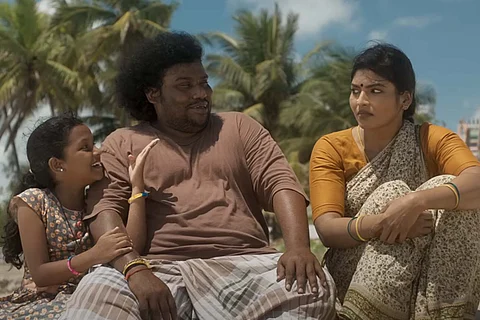

What a relief to see Yogi Babu in a role that doesn’t make a comic element of him, but instead, gives him space to portray a flawed and deeply human character. Bommai Nayagi, by debutant director Shan, attempts to speak about child sexual assault, and how it is interlinked with caste, class, and access to justice. Yogi Babu as Velu, a labourer in a small tea shop, who is the father of nine-year-old Bommai (Sreemathi), brings to life the world-weariness of a man who knows that the system is stacked against people like him. Survival is his priority. To that effect, he thinks that if he keeps his head down, works hard, and focuses on family ties, he can get by. But his misplaced trust in his half-brother Senthil (Aruldoss) leads to a traumatic event in Bommai’s life.
The director attempts to highlight the structural barriers placed in the lives of the lowered caste, working-class populations when they demand justice, but the director who has also written the script struggles to keep the narrative engaging. Apart from Yogi Babu and Hari Krishnan who plays Jeeva, a communist leader, the dialogues and line delivery of most of the cast fall flat. The film tries, it really tries, to assert the dignity of its characters, most of whom come from lowered caste and class backgrounds. On that front, it more or less succeeds, but bad pacing and unconvincing acting let the film down.
Shan handles Bommai’s experience well, ensuring that the incident is mostly only alluded to, rather than graphically represented. It gets right police apathy and the tendency of the cops to work at the behest of dominant caste communities. The pattern of threats and intimidation from powerful caste groups is, true to life, unflinchingly replicated in Bommai Nayagai. Yet, one comes away feeling that as a whole, the film hasn’t quite come together. Except for Velu and Jeeva, the characters don’t get under your skin, urging you to care about them. Ideologically, one may be on the same page as the director, but one also needs protagonists who reach out, shake you up, and demand that you listen to their truths.
However, Yogi Babu, because of the sheer calibre of his skills as an actor, manages to move you. After his role in Mari Selvaraj’s Karnan (2021), this is possibly only the second time we see a role written for him that calls for nuance. Tamil cinema has consistently relegated this talented actor to the sidelines, using him only for casteist jokes and as a punching bag for the hero. Mandela (2021) claimed to be different, but his character was ultimately patornising and offensive.
The actor has a gift of seamlessly weaving his own style of humour with grave emotions that unfailingly make him admirable. As Velu, you see a man who is overburdened, has little faith in the system, and sees no point in caring about issues beyond his own responsibilities. He’s flawed: at once too proud to take financial help from others who truly care about him, but unable to see Sethil’s exploitative derision for him until it’s too late. As a father, he struggles with parenthood, even though Bommai is the centre of his world. All of this comes through beautifully, anchored on the strength of Yogi Babu’s acting.
Hari Krishan is another actor with an ability for breathtaking range. From Madras (2014) to 2021’s Writer, the recent Natchathiram Nagargiradhu, he has consistently given memorable performances. The depth of the writing that went into those characters forms the bedrock of his stunning performances. In Bommai Nayagi, Hari Krishnan manages to convince us that Jeeva is an idealistic, fearless young activist. But you’re left wondering how much more he could have done with that role had the writing been better fleshed out. Subatra Robert as Bommai’s mother Kayalvizhi and Aruldoss, particularly seem short-changed. As actors capable of far more nuanced performances, they too give the impression that it is the inadequate character-building that restrains them.
Bommai Nayagi’s soundtrack is pitch-perfect. Scored by Sundaramurthy, each song tells a story. ‘Adiye Raasaathi’ is a sweet ode to a father and daughter’s affectionate bond. ‘Kadar Kara Kaathu’ in Rockstar Ramanai Ammal's voice, whisks you away to the soothing calm of ocean shores. ‘Saga Uyire’, with its deceptively soft tones, is a moving take on gender justice. Not one track is out of place.
The film’s idealism is unquestionable and its politics is well-meaning. But as a story, it tends to meander at a pace that is almost baffling at times. It is evident that this is Shan's first directorial. His script would have benefited from imbuing his characters with more depth and tightening in multiple sequences, particularly towards the end of the film. Despite this, I hope viewers will take home a deeper understanding of the justice system in the country, and that other filmmakers will attempt to emulate Shan’s sensitivity when making movies on abuse and systemic violence.
Bankrolled by Neelam Productions, Bommai Nayagi releases in theatres on February 3.
Disclaimer: This review was not paid for or commissioned by anyone associated with the film. Neither TNM nor any of its reviewers have any sort of business relationship with the film’s producers or any other members of its cast and crew.